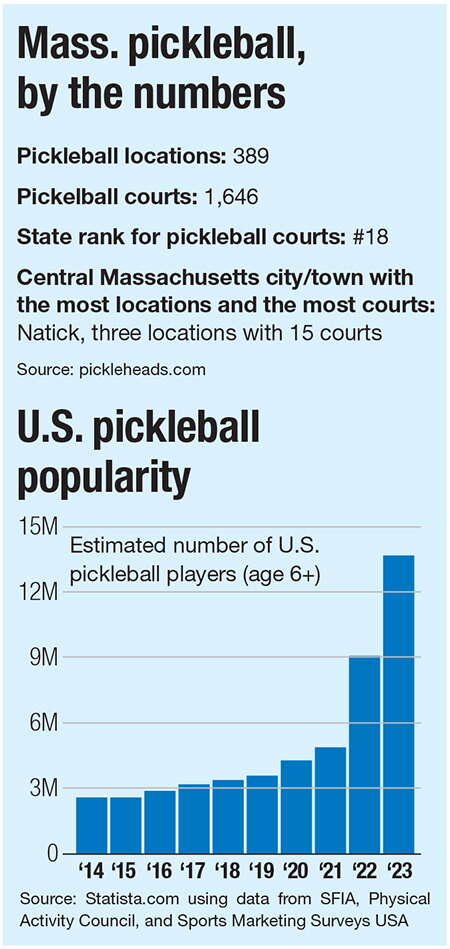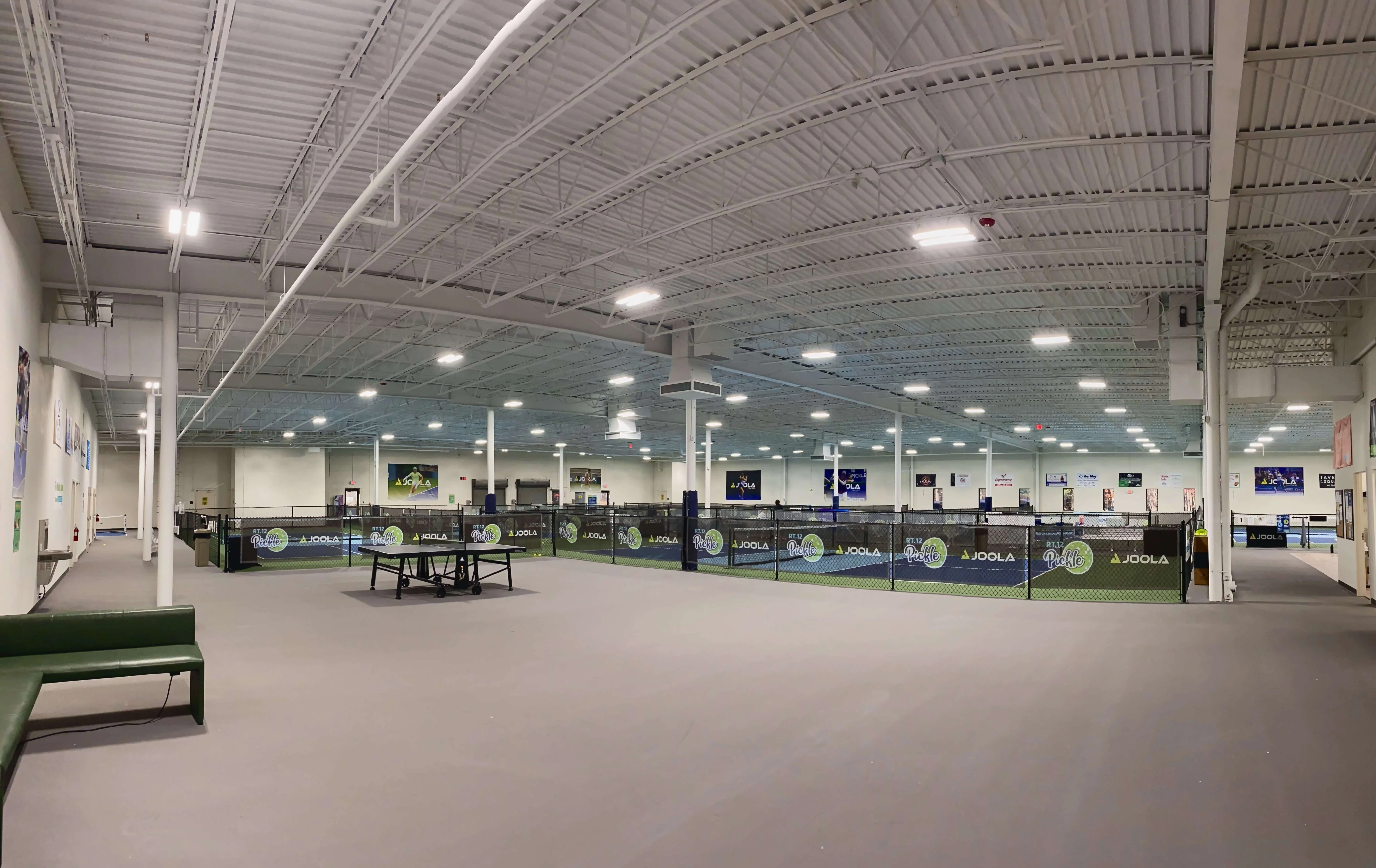Worcester Business Journal
December 2024

Ben Minsk had been in retirement for five years when he decided he needed to find something to do with the rest of his life. His answer? Rt. 12 Pickle, an indoor pickleball club in West Boylston he opened on Feb. 1.
Situated at Wachusett Plaza in a 30,000-square-foot space formerly occupied by long-term tenant Salter College, Minsk was drawn to the location’s high ceilings and lack of obstructive columns to interfere with his courts.
Minsk had viewed a number of both commercial retail facilities and industrial warehouses before finally settling on the 184 West Boylston St. location, and it wasn’t a straightforward path to closing a deal for the facility’s owner Andy Surabian either. In fact, Surabian had gutted the site in an effort to find a tenant for the space previously filled with offices and classrooms.
While the act of converting big-box retail spaces into creative businesses can present several logistical challenges, those challenges can lead to innovative solutions that have become increasingly necessary as digital retail impacts the need for large physical retail spaces.
A study published in 2024 by Cambridge research and advisory firm Forrester found 20% of global retail sales in 2023, totaling $4.4 trillion, were conducted online, a number projected to increase to $6.8 trillion by 2028.
As physical retail faces challenges, owners of Central Massachusetts big-box retail locations are pivoting part of their business models to focus on creative and immersive experiences to get customers out of their homes and reaching for their wallets.
When considering where to open Rt. 12 Pickle, Owner Ben Minsk was drawn to West Boylston’s proximity to Worcester’s approximately 35,000 college students, a largely untapped market he’s excited to infiltrate.
Reimagining Retail

When looking for a tenant for his space that would later be filled by Rt. 12 Pickle, Surabian had considered doing office deals with the Town of West Boylston for schools or Town offices, as well as with retailers including Big Lots, Ocean State Job Lot, and Ollie’s Bargain Outlet, said Tom Bodden, commercial real estate broker at Worcester-based Kelleher & Sadowsky, who represented Surabian.
Since the space had been filled with offices and classrooms, those deals fizzled out as the unique space did not lend itself to a smooth office-to-office conversion. Converting to another use was cost prohibitive.
“So then, we kind of had to go back to the drawing board and get creative on our approach,” said Bodden.
Surabian and Bodden decided the best course of action would be to gut the property, offering a shell space to rent rather than office space. This was the real catalyst in landing the Rt. 12 Pickle deal, said Bodden.
While moving into the demoed location was a cost saver for Minsk, he still had to make modifications. He replaced the sprinkler system for about $80,000 and sealed the floors to prevent water damage for another $50,000.
“If you’re going to open up a place, especially like a pickleball club, make it a class-A looking facility because people will respect that,” he said.
Finding a cool place Minsk is paying a premium rent to have Rt. 12 Pickle in the Wachusett Plaza, but the location has the bonus of housing businesses like Three Rivers Nursery School, Brown Rice Thai Cuisine, and Sneaker Island.
Minsk is paying a premium rent to have Rt. 12 Pickle in the Wachusett Plaza, but the location has the bonus of housing businesses like Three Rivers Nursery School, Brown Rice Thai Cuisine, and Sneaker Island.
Co-tenants are a distinctive perk of locations within malls and retail centers since patrons can hit multiple locations in one stop as opposed to having to go out of their way to reach one business.
Malls and shopping centers can be especially attractive to business owners looking to establish creative businesses, said Bodden. They’re traditionally located in densely populated areas with ample access and parking while serving all demographics.
“That’s a really good equation for success,” he said. “There’s definitely value to that [for] people that are looking at retail space for less conventional retail uses.”
Co-tenancy was a driving factor in Puttshack’s decision to open a location at the Natick Mall, said Dave Diamond, president of the Chicago-based indoor minigolf company.
Puttshack’s Natick location, offering food and beverages with three 9-hole mini golf courses, opened its doors on Feb. 10 in the mall’s previous 21,000-square-foot American Girl store.
Puttshack conducts significant analysis when considering a new venue to open including utilizing subscriptions to capture visit data, such as foot traffic and annual visits, from a location’s surrounding mall retailers, Diamond said.
When considering malls and shopping centers, both in rural and more urban areas, Puttshack holds great stock in the surrounding retailers to gather a fairly simple understanding: Is this a good place to hang out?
Puttshack wants to ensure nearby shopping, eating, and playing opportunities reflect the same new and exciting vibe the company aims to offer. Being adjacent to stores that are in vogue, particularly with younger demographics, lends more credibility to the Puttshack brand itself.
“There is a rhythm to and a feel for these shopping centers that we feel is really important for us to be a part of,” said Diamond.
More opportunities than challenges
When moving into its Natick location, Puttshack had to navigate the facility’s split-level layout with the first floor narrower than the second, forcing the company’s three-person in-house design team to move the location’s main bar up a floor. That move ended up being an opportunity to make for more intimate private events on the first floor, an unexpected yet very welcomed outcome for Diamond.
“There’s definitely far more opportunity than there are challenges with leasing these spaces, and that’s why we’re seeing so many different deals happening,” said Bodden.
A lot of malls are struggling right now with retailers closing and filing for bankruptcy, said Bodden. While he certainly doesn’t foresee the in-person retail market being obliterated by the likes of Amazon, the market will be constrained.
Mall operators and urban developer landlords need to be cognizant of what can be bought online, even from a brick-and-mortar store’s own proprietary website, Diamond said. If landlords want to attract and retain tenants, they’re going to need to look for options that can’t be delivered to a customer’s doorstep.
Instead of this being limiting, Diamond sees it offering exciting possibilities for customers and business owners.
“Unlike a lot of the soft goods and things that you can buy online, you really can’t go out to eat and play a game like mini golf by staying home,” he said. “So it does create an opportunity for them to entertain new businesses like ours, and I do think we are just scratching the surface.”
By Mica Kanner-Mascolo



